After a year 2022 marked by very high sea freight rates and a shortage of fertilizers, and a 2023 shaped by adverse weather conditions, the Peruvian fruit and vegetable sector is trying to recover in the best way possible, facing future challenges with great optimism, perseverance and ingenuity. This year, Proserla, a producer and packer from the north of Peru, specialized in table grapes, avocados and limes, hopes to recover the productive potential and commercial success it had before 2022.
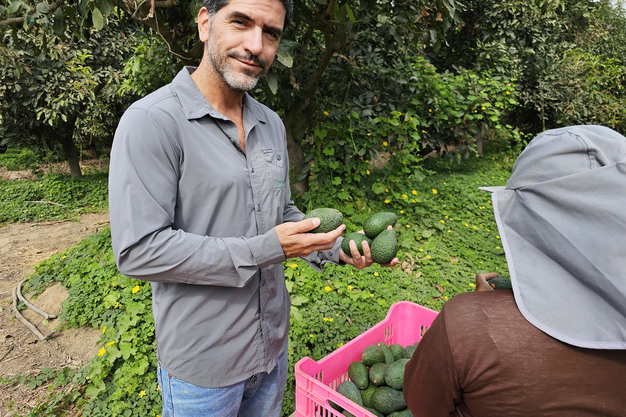
Alonso Puga.
Proserla was founded in 2006 and is owned by two families, the Mustafás and the Pugas. "We started with the cultivation of peppers and 10 hectares of table grapes," says General Manager Alonso Puga. "In fact, we were one of the first companies to produce table grapes in the north of Peru. Today, we manage 250 hectares of table grapes, harvested from September to December, 200 hectares of avocados, with a campaign that goes from January to mid-May, and 75 hectares of Tahiti limes, which are marketed all year round, with sales peaks between February and April and between October and November."
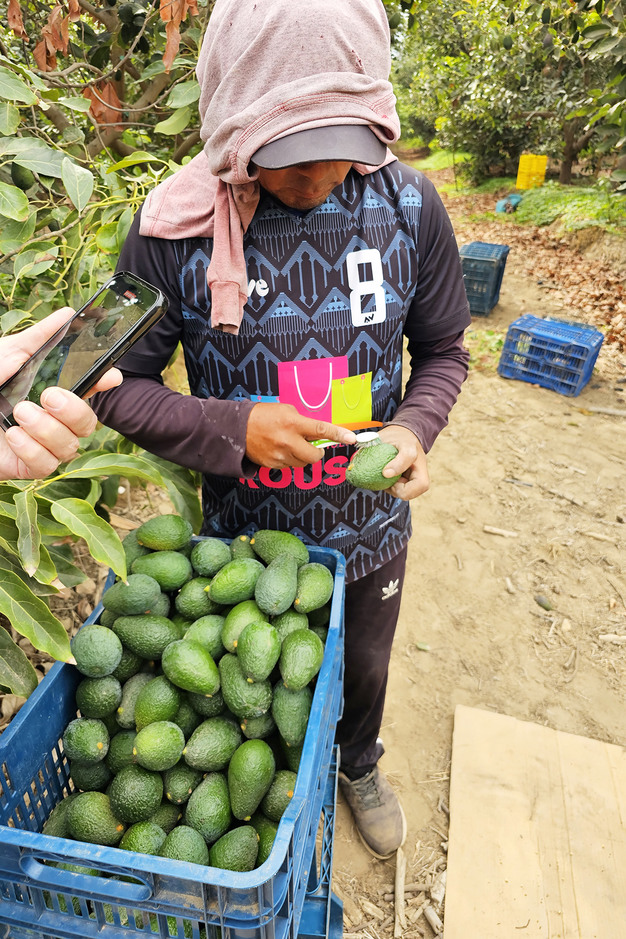
The first cleaning of avocados intended for the Chinese market is done in the field.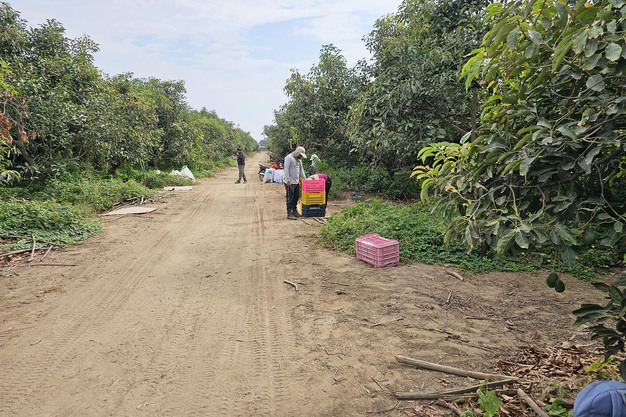
Abandonment of mango cultivation
In the past, the company also produced mangoes on 120 hectares, but in 2017, the difference between mango and avocado crops in terms of resistance to wet conditions under the influence of El Niño became evident, so it was decided to uproot the mango trees and replace them with avocado plants. "Moreover, avocados also yield better results in the market," says Alonso.
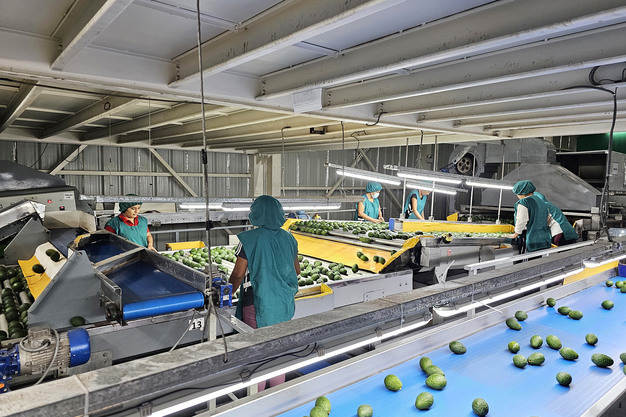
Conveyor belt with avocados.
Proserla employs about 500 people throughout the year, with a peak of 1,000 employees during the table grape pruning and harvesting season, to which we must add another 1,000 workers in the packing plant when the harvest is in full swing. "Since there are also blueberry production areas in the country, which require a lot of labor, competition in the labor market is fierce, pushing up wages in the Peruvian fruit and vegetable sector."
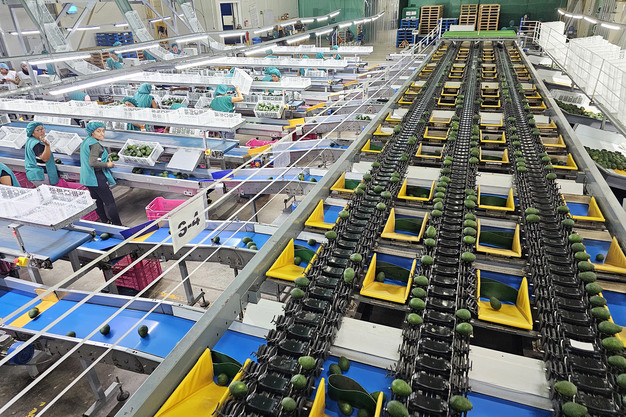
Maf Roda sorting line with 6 channels.
Five table grape varieties
Regarding table grapes, Proserla cultivates five varieties: Red Globe (50 hectares), Autumn Crisp (140 hectares), Scarlotta (5 hectares), Sweet Globe (30 hectares), and Sweet Celebration (25 hectares). "The packing is done in our own facilities, where we also provide services to third parties. We handle an average of 200 tons of table grapes per day in the packing plant. 50% of our table grapes are intended for the European market, 40% for North America and LATAM and 10% for China. And while the European market has a stricter stance on MRLs, the U.S. market is more rigorous when it comes to phytosanitary issues, to prevent the introduction of pests."
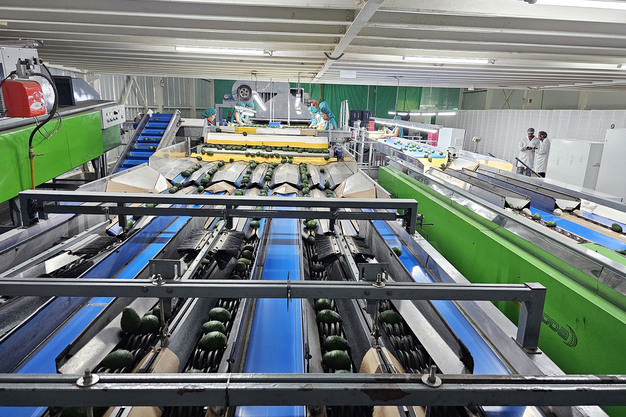
Last year, table grapes were affected by unfavorable conditions caused by both cyclone Yaku in March and April, and by the warm winter due to the El Niño phenomenon, according to Alonso. "The Autumn Crisp, Sweet Globe and Red Globe productions were reduced by around 40%, and the Scarlotta and Sweet Celebration were also slightly affected. Things are looking more promising for the season in 2024, with greater fertility in the plantations. The El Niño phenomenon did not bring the feared rains. The phenomenon has ended, and the plants are gradually reaching their physiological maturity. In fact, a larger production is expected across Peru after a year in which the volume was estimated to fall by 12%."
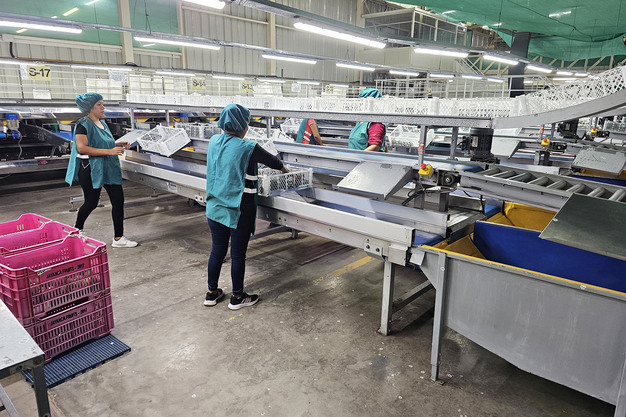
10 kg plastic boxes.
"The chess game we will have to play"
Last year, after the passage of cyclone Yaku in April, which caused about 700 mm of rain to fall in just eight weeks, the minimum temperatures stood at 21-23 degrees Celsius, far exceeding the 17-18 degrees Celsius which are usually recorded in the winter period. "The growth pace of the vines was altered. In a normal year, 160 days pass between the pruning and harvesting of the Autumn Crisp, but last year that period was reduced to barely 125 days. And while the clusters usually have a weight of 700-750 grams, last season they only reached 300-350 grams. We are facing great challenges this year, not only because we have to overcome the economic losses suffered last season, but also because Peru will be delivering very large volumes to the market, as the weather conditions in the country have been favorable for table grapes. Also, most of the acreage is taken by modern varieties planted in recent years. With such volumes, we will need a sales strategy based on quality and timely harvests. That's the chess game we will have to play," says Alonso.
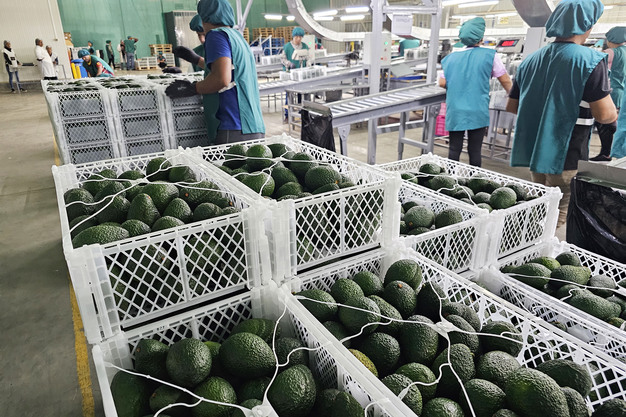
Small-sized avocados
As for avocados, Proserla's campaign is in its final stretch. "In a normal season, the last avocados are harvested by mid-May. This year, however, due to changes in the flowering periods caused by last winter's high temperatures, the harvest is more staggered and we will be able to pick the fruit until mid-June. However, due to the high degree of radiation and low humidity levels in summer, the sizes have been affected. The fruit is still ripe and the dry matter content isn't lower than expected, but the fruit's average size is simply smaller. In fact, we expect a 20-30% drop in the harvest this year. While last year we recorded a yield of about 24-25 tons per hectare, this year we are barely reaching 17-18 tons due to the smaller sizes."
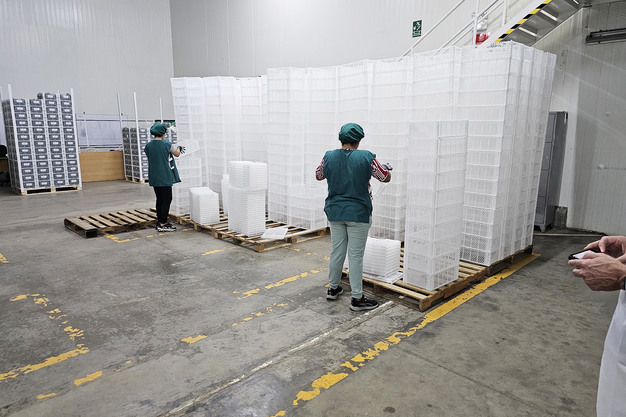
The boxes are manually prepared.
Attractive prices in the local market for Tahiti limes
95% of the avocados produced by Proserla are intended for the European Union. The remaining 5% are shipped to China. Limes, on the other hand, are exported both to the U.S. and the European market. "The lime crops were also affected by El Niño and cyclone Yaku, since limes are very sensitive to rain. In the second part of the season, between July and September, the supply was very limited, so the local market, which is a big buyer of limes, offered very attractive prices. Even now, we prefer to market the limes in the domestic market, in part because the U.S. market is well supplied with the Mexican production and the European market with fruit of Brazilian origin," says Alonso Puga.
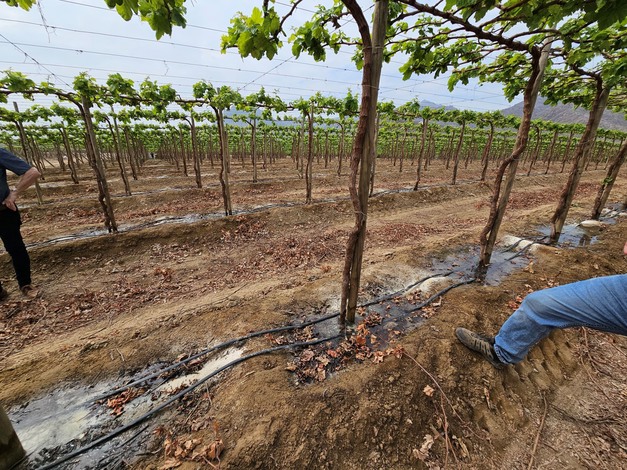
Proserla cultivates modern table grape varieties on 200 hectares.
For more information:
Alonso Puga (General Manager)
Proserla
Calle Antolín Flores 1580
Jayanca, Lambayeque. Peru
Tel.: +51 979 344 611
[email protected]
www.proserla.com
